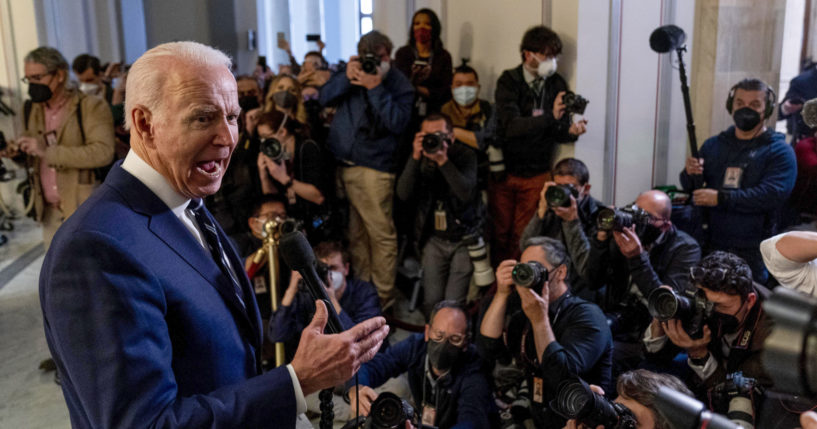
Biden Dejected After Sinema Blocks Democrats' Attempt to Change Senate Rules for Election Bill
All but conceding defeat, President Joe Biden said Thursday he’s now unsure the Democrats’ major election legislation can pass Congress this year.
He spoke at the Capitol in Washington after a key fellow Democrat, Sen. Kyrsten Sinema of Arizona, reconfirmed her refusal to go along with changing Senate rules to muscle the bill past a Republican filibuster.
Biden had come to the Capitol to prod Democratic senators in a closed-door meeting, but he was not optimistic when he emerged.
He vowed to keep fighting for the sweeping legislation that Republicans say would undermine the integrity of U.S. elections.
“The honest to God answer is I don’t know whether we can get this done,” Biden said. He told reporters, his voice rising, “As long as I’m in the White House, as long as I’m engaged at all, I’m going to be fighting.”
Sinema all but dashed the bill’s chances minutes earlier, declaring just before Biden arrived on Capitol Hill that she could not support a “short-sighted” rules change.
She said in a speech on the Senate floor that the answer to divisiveness in the Senate and in the country is not to change filibuster rules so one party, even hers, can pass controversial bills.
“We must address the disease itself, the disease of division, to protect our democracy,” the senator said.
Sinema Delivers Senate Floor Remarks on Voting Rights, America’s Divisions, and the U.S. Senate https://t.co/72zAFWDPjO
— Kyrsten Sinema (@SenatorSinema) January 13, 2022
The moment once again leaves Biden empty-handed after a high-profile visit to Congress. Earlier forays did little to advance his other big priority, the Build Back Better Act of social and climate change initiatives. Instead, the president returned to the White House with his agenda languishing in Congress.
Biden spoke for more than an hour in private with restive Democrats in the Senate, including Joe Manchin of West Virginia, who also opposes changing Senate rules.
Manchin said in a statement later: “Ending the filibuster would be the easy way out. I cannot support such a perilous course for this nation.”
.@Sen_JoeManchin issues a long new statement reiterating his support for the Senate’s 60-vote rule: “As such, and as I have said many times before, I will not vote to eliminate or weaken the filibuster.”
In full: pic.twitter.com/iUuJwc8PN9
— Sahil Kapur (@sahilkapur) January 13, 2022
Both senators went to the White House on Thursday evening for an additional hour, which the White House later described as “a candid and respectful exchange of views.”
Since taking control of Congress and the White House last year, Democrats have vowed to counteract a wave of new state laws enacted to strengthen the integrity of elections. But their efforts have stalled in the narrowly divided Senate, where they lack the 60 votes out of 100 needed to overcome a Republican filibuster.
Republicans are nearly unanimous in opposing the legislation, viewing it as federal overreach that would infringe on states’ abilities to conduct their own elections. And they’ve pointed out that Democrats opposed changes to the filibuster that Trump sought when he was president.
For weeks, Sinema and Manchin have come under intense pressure from the left to support rules changes that would allow the party to pass their legislation with a simple majority — a step both have long opposed.
Senate Minority Leader Mitch McConnell of Kentucky called Sinema’s speech an important act of “political courage” that could “save the Senate as an institution.”
Many of her other colleagues disagreed.
Sen. Angus King, a Maine independent who once opposed changing the Senate rules, said, “She believes that the risk of changing the filibuster is greater than the risk of what’s going on in the states. I hope profoundly that she’s right. I fear that she’s wrong.”
Biden’s trip to the Capitol, where he served for decades as a senator from Delaware, was part of a weeklong effort to jolt the stalled legislation. On Tuesday, the president gave a divisive speech in Atlanta in which he likened opponents of the legislation to racist historical figures.
Democrats have still pledged to force a public showdown over the bill on the Senate floor, which could stretch for days.
Senate Majority Leader Chuck Schumer had initially set Monday’s Martin Luther King Jr. holiday as a deadline to either pass the voting legislation or consider revising the filibuster rules.
But after one Democratic senator tested positive for COVID-19 and went into isolation, denying the party a needed vote, Schumer canceled a planned Senate recess week and said debate would instead begin Tuesday.
Democrats shifted their legislative strategy, too, as they sought to pressure Manchin and Sinema. Under their new approach, which uses a procedural shortcut, they will be able to debate the bill without being blocked by a filibuster.
The mechanics work like this: The House amended and passed an unrelated bill that was already approved by both chambers of Congress, combining Democrats’ voting proposals into one bill.
Because that bill already passed both chambers, it can be called for debate in the Senate with a simple majority, though Senate Republicans can still block a final vote to pass the measure.
“Members of this chamber were elected to debate and vote, particularly on an issue as vital to the beating heart of democracy as this one,” Schumer said late Thursday.
The Western Journal has reviewed this Associated Press story and may have altered it prior to publication to ensure that it meets our editorial standards.
Truth and Accuracy
We are committed to truth and accuracy in all of our journalism. Read our editorial standards.
Advertise with The Western Journal and reach millions of highly engaged readers, while supporting our work. Advertise Today.












